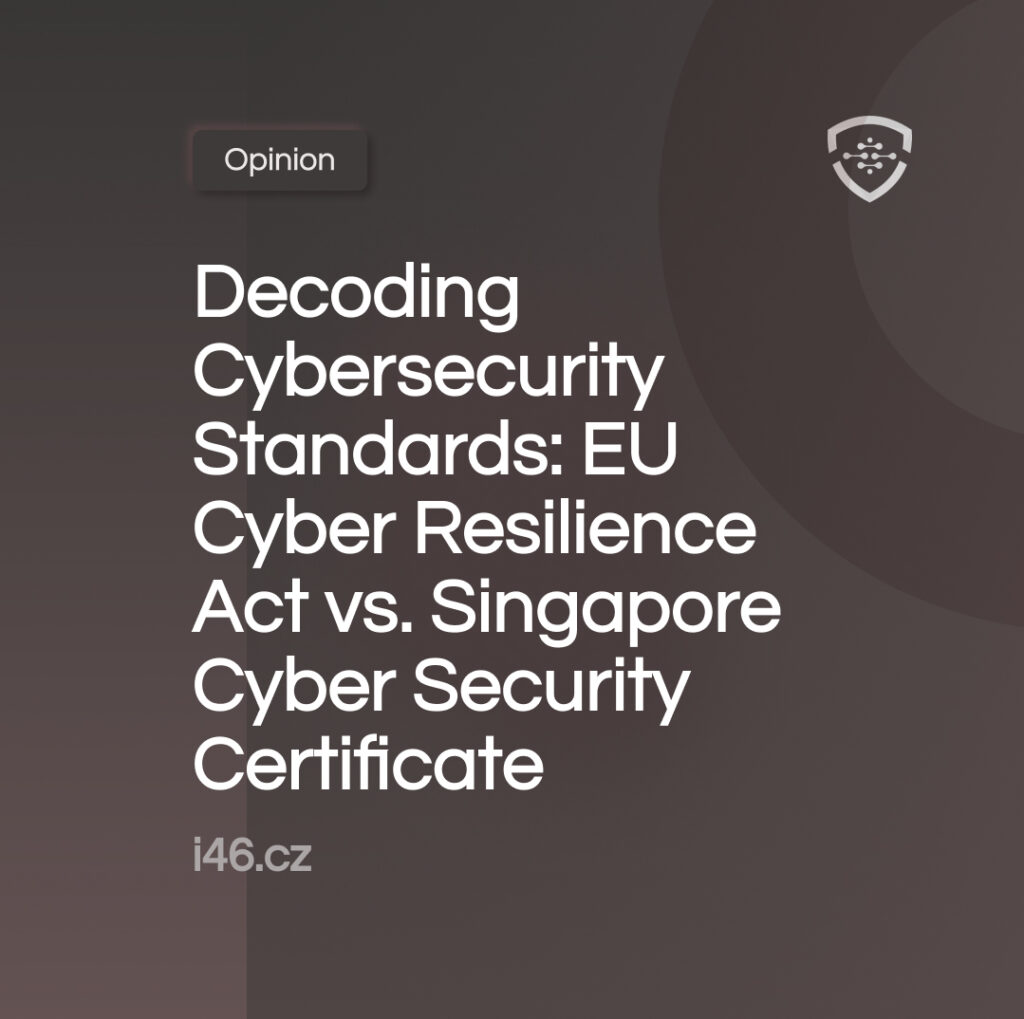Decoding Cybersecurity Standards: EU Cyber Resilience Act vs. Singapore Cyber Security Certificate

Introduction: The Increasing Significance of Cybersecurity in Modern Society
In today’s digitally-driven world, where connectivity is ubiquitous and technology permeates every aspect of daily life, cybersecurity has emerged as a critical concern for individuals, businesses, and governments alike. The proliferation of interconnected devices, the rise of cloud computing, and the expansion of digital infrastructure have created unprecedented opportunities for innovation and growth. However, they have also introduced new vulnerabilities and threats, ranging from data breaches and cyber-attacks to identity theft and ransomware incidents. Against this backdrop, regulatory bodies such as the European Union (EU) and the government of Singapore have recognized the imperative of bolstering cybersecurity measures to safeguard digital assets and protect against malicious actors.
Scope: Assessing the Regulatory Reach
The EU Cyber Resilience Act (CRA) represents a sweeping regulatory framework designed to enhance cybersecurity standards across the European Single Market. By encompassing EU member states as well as Norway, Iceland, and Liechtenstein, the CRA establishes a unified approach to cybersecurity governance, ensuring consistency and coherence in regulatory enforcement. Its broad scope extends to a diverse array of stakeholders involved in the digital ecosystem, including manufacturers, developers, distributors, and retailers. By imposing mandatory cybersecurity requirements on a wide range of products and services, the CRA aims to strengthen the resilience of the European digital infrastructure and bolster consumer confidence in the safety and security of digital technologies.
Conversely, the Singapore Cyber Security Certificate operates as a voluntary system certification scheme, offering companies the flexibility to demonstrate their commitment to cybersecurity excellence voluntarily. While participation in the singaporean system certification program is not obligatory, certified entities can leverage the Singapore Cyber Security Certificate as a tangible proof of their dedication to cybersecurity best practices. This voluntary approach reflects Singapore’s commitment to fostering a culture of cybersecurity awareness and incentivizing businesses to proactively invest in cybersecurity measures to protect against emerging threats and vulnerabilities.
Focus: Strategies for Enhancing Cyber Defense
At the core of the EU Cyber Resilience Act lies a proactive strategy of embedding cybersecurity principles into the DNA of digital products and services. By mandating manufacturers to prioritize security throughout the entire lifecycle of their offerings, from conception and design to deployment and maintenance, the Cyber Resilience Act seeks to instill a culture of security-by-design. This forward-thinking approach aims to preemptively identify and mitigate potential vulnerabilities, thereby enhancing the overall resilience of digital ecosystems against evolving cyber threats. Examples of security measures mandated by the Cyber Resilience Act may include encryption protocols, access controls, and vulnerability management procedures.
In contrast, the focus of the Singapore Cyber Security Certificate centers around the adoption of established best practices and standards within the cybersecurity domain. While the specific requirements may vary depending on the chosen certification scheme, the overarching objective is to promote the adoption of industry-recognized cybersecurity measures. Examples of best practices endorsed by the Singapore Cyber Security Certificate may include adherence to international standards such as ISO/IEC 27001, implementation of multi-factor authentication, and regular security assessments and audits. By aligning with prevailing best practices, certified entities can demonstrate their commitment to maintaining robust cybersecurity posture, thereby bolstering consumer confidence and market competitiveness.
Enforcement: Balancing Compliance and Incentives
The EU Cyber Resilience Act adopts a robust enforcement mechanism, imposing stringent penalties on entities that fail to comply with the mandated cybersecurity standards. Products found to be non-compliant with the Cyber Resilience Act’s requirements risk being barred from the EU market, thereby facing significant commercial repercussions. This strict enforcement regime underscores the European Union’s commitment to upholding cybersecurity standards and protecting the interests of consumers within the European Single Market.
In contrast, the Singapore Cyber Security Certificate operates on a voluntary basis, without imposing direct penalties for non-participation. However, obtaining certification offers tangible benefits, including enhanced market credibility and consumer trust. Certified entities can leverage the Singapore Cyber Security Certificate as a valuable differentiator in a competitive marketplace, thereby gaining a strategic edge over non-certified counterparts.
Choosing the Right Path: Strategic Considerations
For companies operating within the EU market, compliance with the CRA is imperative, necessitating adherence to the prescribed cybersecurity standards. However, for businesses with a global footprint, including operations in Singapore and beyond, the decision to pursue certification under the Singapore Cyber Security Certificate scheme warrants careful consideration. While voluntary in nature, certification can confer significant advantages, such as enhanced market credibility and consumer trust, which may outweigh the associated system certification costs and efforts.
Additional Considerations: Exploring Regional Dynamics
While the focus of this discussion has primarily centered on the regulatory frameworks within the EU and Singapore, it is essential to acknowledge the broader regional dynamics shaping the cybersecurity landscape. Across the Asia-Pacific region (APAC), diverse regulatory regimes and market dynamics present unique challenges and opportunities for businesses seeking to navigate the complex terrain of cybersecurity compliance. Researching top system certification providers in the APAC region can help businesses identify additional certification programs that align with their specific needs, regional considerations, and budget constraints.
Key Takeaways: Navigating the Complexities of Cybersecurity Governance
In conclusion, the EU CRA and the Singapore Cyber Security Certificate represent distinct yet complementary approaches to addressing the multifaceted challenges of cybersecurity governance. By understanding the nuances of these regulatory frameworks and strategically leveraging them to enhance cybersecurity posture, businesses can mitigate regulatory risks, build consumer trust, and gain a competitive edge in an increasingly interconnected world. By prioritizing cybersecurity as a core business imperative, companies can effectively navigate the complexities of the digital landscape and safeguard their digital assets against evolving cyber threats.



